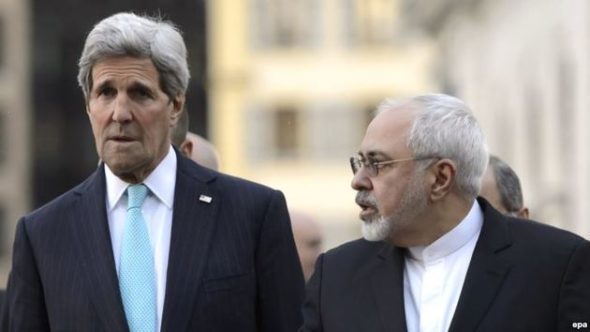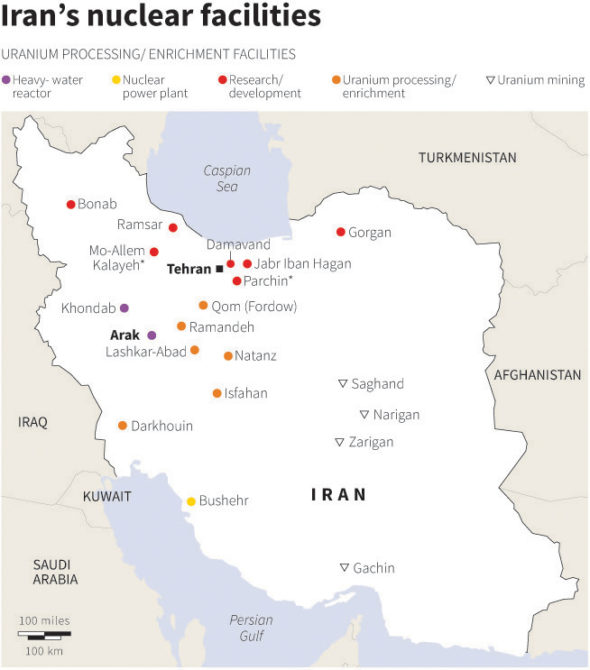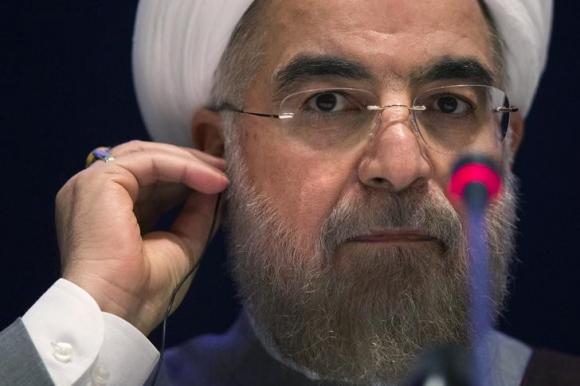U.S., Iran Explore Option of 10-Year Nuclear Freeze
Daily News Article — Posted on February 25, 2015

U.S. Secretary of State John Kerry, right, speaks with Iranian Foreign Minister Javad Zarif in Geneva on Jan. 14.
(by Laurence Norman, The Wall Street Journal) GENEVA—The U.S. and Iran are exploring a nuclear deal that would keep Tehran from amassing enough material to make a bomb for at least a decade, but could then allow it to gradually build up its capabilities again.
Such a deal would represent a significant compromise by the U.S., which had sought to restrain Tehran’s nuclear activities for as long as 20 years. Tehran has insisted on no more than a 10-year freeze.
The possible compromise on the table appears closer to Tehran’s timeline. While it would add some years in which the Iranian nuclear program continues to be closely monitored and constrained, Iran would be able to increase its capacity to enrich uranium, and thus get closer to bomb-making capability again.
Critics in Congress and in Israel quickly attacked the prospect of a 10-year time frame as inadequate.
After four days of talks in Geneva, a senior Obama administration official on Monday said there had been welcome progress toward a deal, while giving no specifics about its timeline.

The U.S. has been pushing for a freeze that would establish a period of time during which Iran would remain at least 12 months away from being able to fuel an atomic bomb—a so-called breakout period. Asked if Iran must accept that breakout period through the lifetime of an accord, the person signaled that may not be necessary.
“We have always said that we would have a one-year breakout time for a double-digit number of years and that remains the case,” the official said. That suggests a period of as little as 10 years. When pressed, the official declined to elaborate. [breakout time refers to the length of time that the Iranians would require to make a bomb were they to decide to suddenly abandon the agreement altogether and immediately resume enrichment. A year-long “break out” capacity would give the outside world a reasonable length of time to respond.]
Such a compromise could allow Iran to portray the major restrictions on its nuclear program at home as lasting only 10 years – an upper limit Iranian officials have mentioned before. Iran says its nuclear program is a purely civilian, peaceful one. [No world leaders believe this to be true.]
It also could break the impasse over how many centrifuges (machines for enriching uranium) Tehran would be allowed under a deal. If Iran can expand its activities, it could start with fewer centrifuges and then be allowed to operate more over time.
The U.S. and its global partners could argue that Tehran’s activities will remain under significant international oversight and with some constraints for much longer.
U.S. lawmakers have said they’re going to closely scrutinize any agreement with Tehran and try to force a vote in Congress on it. A deal that allows Tehran to maintain a sizable capacity to enrich uranium, and to eventually be freed to pursue a broader nuclear program, is expected to face fierce opposition.
The Obama administration maintains that it doesn’t need congressional approval for the deal because it isn’t a treaty, although Congress would have to vote to lift some of the sanctions it has imposed on Iran over the years.
Sen. Bob Corker (R., Tenn.) said in an interview that a 10-year time frame wasn’t long enough to truly curb Tehran’s nuclear ambitions.
“If you’re going to do all of this and then just end up with a 10-year agreement, you just really haven’t accomplished near what people had hoped,” said Mr. Corker, who chairs the Senate Foreign Relations Committee. Such a time frame would be “very concerning,” he added….
The Israeli government has been a leading critic of the talks, which Prime Minister Benjamin Netanyahu on Sunday warned were destined to end in a “dangerous” deal.
On Monday, Israeli Intelligence Minister Yuval Steinitz said Israel considers the negotiations “totally unsatisfactory” because it would allow Iran to be “extremely close” to a “dangerous breakout program.”

Iran’s President Hassan Rouhani listens to a question during a news conference on the sidelines of the 69th United Nations General Assembly at United Nations Headquarters in New York Sept. 26, 2014. (Photo: Reuters/Adrees Latif)
Referring to the latest suggested compromise, he said, “for a 10-year delay [in Iran’s nuclear program] you are sacrificing the future of Israel and the U.S., and the future of the world.” [The Iranian government has called for the destruction of Israel on numerous occasions. It is believed that once obtained, Iran would use nuclear weapons against Israel.]
Mr. Netanyahu will travel to Washington next week to make his case against the diplomacy. He is due to deliver a speech to Congress on March 3, at the same time U.S. and Iranian diplomats will be back in Europe seeking to advance work on a deal. The two sides are aiming to complete a framework deal by late March and have a full, detailed agreement by a June 30 deadline.
U.S. lawmakers have threatened to impose fresh sanctions on Iran if the March deadline is missed—a step that could scuttle the diplomacy. …..
Western officials said a phased structure could apply in other areas as well, such as when international sanctions on Iran will be lifted, or when Iran could resume nuclear research. Still, Western diplomats insisted that real differences remained.
The concerns about Iran’s [nuclear program] are a threat to any agreement on the enrichment issue. If Tehran is able to develop far more powerful centrifuges, Iran would be able to produce enough nuclear material for a bomb in less than a year. …
—Joshua Mitnick in Tel Aviv and Michael R. Crittenden in Washington contributed to this article.
Copyright 2015 Dow Jones & Company, Inc. All Rights Reserved. Reprinted here for educational purposes only. May not be reproduced on other websites without permission from The Wall Street Journal. Visit the website at wsj .com.
Background
ON URANIUM ENRICHMENT:
Enriched uranium is a critical component for both civil nuclear power generation and military nuclear weapons. The UN’s International Atomic Energy Agency attempts to monitor and control enriched uranium supplies and processes in its efforts to ensure nuclear power generation safety and curb nuclear weapons proliferation (buildup).
IRAN’S NUCLEAR PROGRAM:
- Iran’s 20 year secret nuclear program was discovered in 2002. Iran says its program is for fuel purposes only, but it has been working on uranium enrichment which is used to make nuclear bombs. [NOTE ON URANIUM ENRICHMENT: Enriched uranium is a critical component for both civil nuclear power generation and military nuclear weapons. The International Atomic Energy Agency attempts to monitor and control enriched uranium supplies and processes in its efforts to ensure nuclear power generation safety and curb nuclear weapons proliferation (buildup).]
- Under the United Nations’ NPT (Non Proliferation Treaty) countries are not allowed to make nuclear weapons (except for the 5 that had nuclear weapons prior to the treaty – the U.S., Russia, China, France, the United Kingdom).
- Safeguards are used to verify compliance with the Treaty through inspections conducted by the UN’s nuclear watchdog, the IAEA (International Atomic Energy Agency).
- The IAEA has consistently stated it is unable to conclude that Iran’s nuclear program is entirely peaceful.
- The IAEA issued a report on Sept. 15, 2008 that said Iran has repeatedly blocked an investigation into its nuclear program and the probe is now deadlocked.
- The U.N. Security Council has already imposed four sets of sanctions on Iran over its nuclear defiance. Despite the sanctions, Iran has refused to end its nuclear program.
- A group of U.S. and Russian scientists said in a report issued in May 2009 that Iran could produce a simple nuclear device in one to three years and a nuclear warhead in another five years after that. The study, published by the nonpartisan EastWest Institute, also said Iran is making advances in rocket technology and could develop a ballistic missile capable of firing a 2,200-pound nuclear warhead up to 1,200 miles “in perhaps six to eight years.”
- The Iranian government has called for the destruction of Israel on numerous occasions. It is believed that once obtained, Iranian President Ahmadinejad would use nuclear weapons against Israel.
